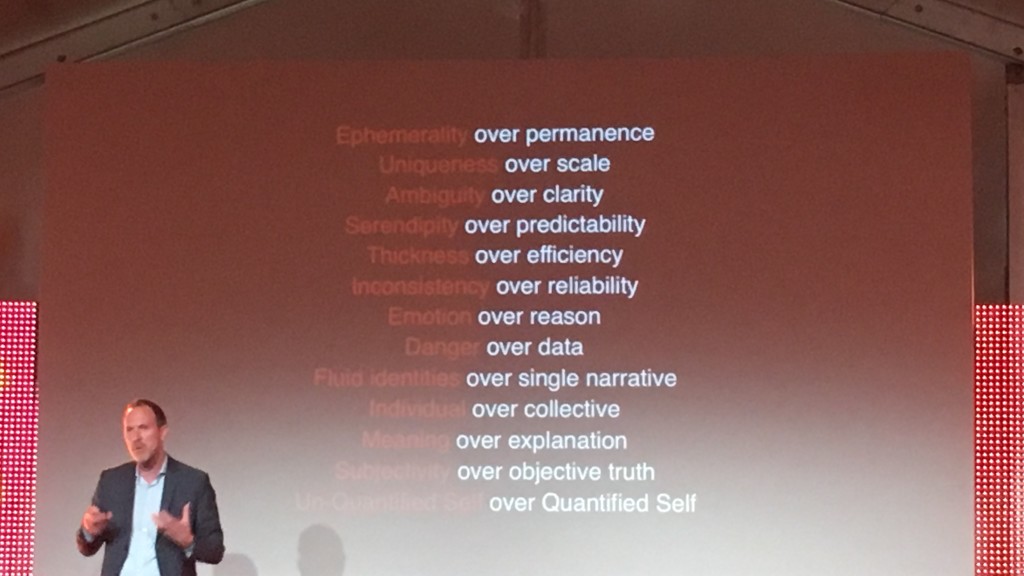Romantic Feelings about a Data-Driven World
A write-up of Tim's talk at The Next Web in Amsterdam

As aFrogleap we have been writing about robots and chat bots, AI (Artificial Intelligence), data and, endlessly, about how to make a personal and contextually relevant experience. As you might agree with me, this is all driven by gathering, measuring, analyzing and enriching data. When we recently peeked into the future, we also explored the ideas about what chat bots and AI could mean for us. The possibilities expand with these new technologies.
But be aware of the fact that there’s another side to this future. When everything is measured and analyzed, the great question is not if robots can learn to think and anticipate our needs, but if humans can still feel in the future? Last Thursday on The Next Web we listened to the passionate story of author Tim Leberecht about “The Business Romantic” and the new romantic movement. It gave us serious food for thought.
Data driven romance?
Leberecht advocates for new future romantic poets. He refers to the Romanticism – emerged in the late 18th century as a revolutionary reaction against rationalism – which values true emotion and feeling.
Present-day, we see what the data driven world is doing with us. Everyone’s attention is drawn to their smartphone screen. We use spreadsheets in bed to track our sexual performances… and BreakupText when things are not ‘working out for us anymore’. Anything, just to avoid dealing with the social inconveniences that come with emotional real life experiences. It has even come to the point where we are in need of an Invisible Boyfriend…
“The opposite of loneliness is not togetherness, but intimacy. Where did intimacy go?”
Rather, look around and find the big inspiration in the small details that you experience. Let things be a coincidence and mysterious. We are in need of things such as subjectivity, ambiguity and mystique. Be open to unexpected serendipity moments and bring back true conversations and intimacy.
The new romantic movement
As a countermovement to new data driven technologies we should keep secrecy and mystique to keep the experience alive. Leberecht notices that this new romantic movement is happening now and visible in several examples. One of his friends, for example, organizes explorative city walks in New York with the rule of leaving out all digital devices in order to truly connect with the people around you for eight straight hours. ‘Connected intimacy with strangers’, and this actually seems to be difficult for people! Another example is shown by this ‘service’, let’s have dinner and talk about death, to moderate this important discussion. Ok, this is maybe a bit extreme but try something different.
More initiatives have come up, such as things like mystery messaging with Traces, which allows you to bring romance back into your communication. And then there is Forgotify, a place where you can stream millions of songs that have been forgotten and never played before on Spotify. Aww, doesn’t that make your heart melt a little? It’s kind of funny and sad at the same time, but it does make you curious, right?

Tim Leberecht @ TNW
Designing friction
To create true meaning in life, it is both inevitable and necessary to suffer a little. Don’t get instant gratification. Think about love: would it be worth the same without having to suffer a little? Experiencing some friction and putting effort into things you want to achieve has the purpose of adding value. An example of purposeful friction is when you are ‘assembling’ your brand new IKEA bed. It ultimately makes you feel pleased and sleep tight. Leberecht cheers for long term romantic ideas such as loyalty cards. We keep collecting points on loyalty cards that we have in our (digital) wallets, but do we ever redeem our collected points? Probably not. Loyalty programs are about permanent suffering…
What we’ve learned is that you should create emotion in your experience. Not just “meaningless seamlessness” within this data driven world. When things do not come as easily, you will probably appreciate the experience more. Designing friction might seem contradictory to designing happiness, about which we learned during SXSW. However, friction is the necessary path we need to take to ultimately experience happiness. So, choose ambiguity over clarity sometimes, emotion over reason and meaning over explanation.
“Not just do good, feel good, but FEEL MORE.”
Want to read more about our learnings out of our visit to TNW? Find out why we think that AI and mobile go hand in hand in our next blog.
This article first ran on A FrogLeap.